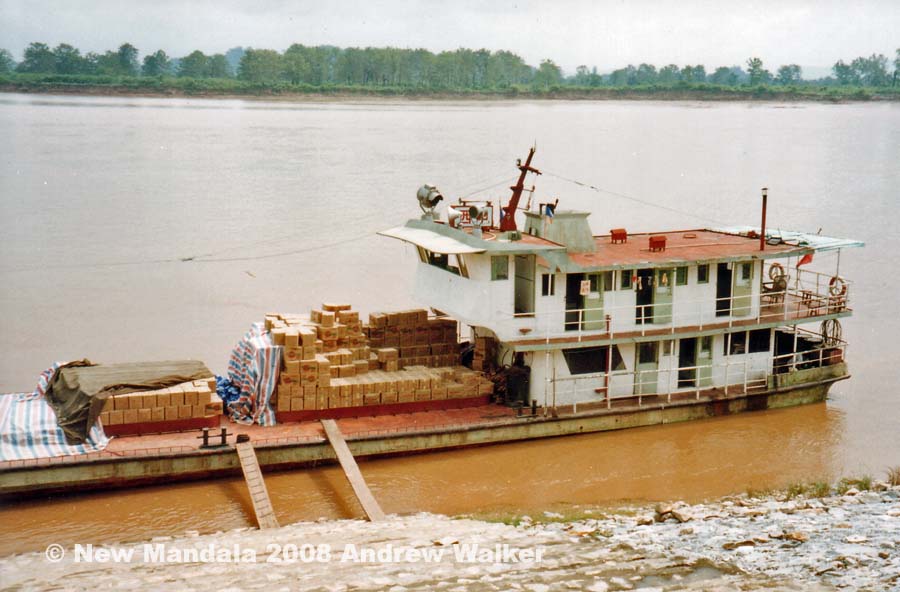
A chinese boat unloading apples in Chiang Saen in 1994
Timothy Hamlin of the Stimson Center has written this update on commercial navigation on the upper-Mekong. It seems that the environmentally dubious project of blasting the Mekong rapids between southern China and northern Thailand is now all but complete, making the way for a greater influx of Chinese boats into the northern Thai Mekong port of Chiang Saen.
If any New Mandala readers have had a chance to observe these developments first hand, we would be very happy to post a report!
The topic of Mekong navigation brings me back to one of my favourite topics – not sufficiency economy or coyote dancing, I’m afraid, but garlic. Timothy Hamlin’s report repeats the common claim about the impact of the import of Chinese garlic on Thai producers:
Thai farmers have already felt the impact of cheap garlic arriving from Yunnan, and they will continue to feel pressure until the markets equalize.
In previous posts (here and here) I expressed some scepticism about the view that imports from China are the sole, or even primary, driver of garlic prices in Thailand. The garlic price in Thailand certainly did drop in 2004 (the first full year of the agricultural trade agreement with China) but it recovered after that, to reach record levels in 2007. This year it has fallen again, for reasons that are not clear.
While researching this issue I came across this news clipping in my data-base.
Garlic growers yesterday laid siege to Chiang Mai city hall and set up a road block in Mae Hong Son to demand government action over the low price of their produce. They want the government to guarantee them a price of 17-20 baht per kilogramme of garlic – the current market price is five or six baht a kilo. In Chiang Mai, more than 1,500 growers, who began their rally yesterday, laid siege to the city hall while negotiations between their representatives and Deputy Commerce Minister Chalermphol Sanitwongchai took place. Mr Chalermphol flew to Chiang Mai yesterday to meet the protesters. Those attending the meeting included Chiang Mai MP Kingkarn na Chiang Mai and protester representatives led by Theera Jiaboonyok. Demonstrators burned effigies of Prime Minister Chavalit Yongchaiyudh, Agriculture Minister Chucheep Harnsawat and Commerce Minister Narongchai Akrasanee yesterday afternoon. They also threatened to set fire to the city hall if their demands were not met. Officials were prevented from entering city hall to work. Protesters had come from Mae Taeng, Fang and Chiang Dao districts of Chiang Mai, as well as from Lamphun and Mae Hong Son provinces. They blame the low price of garlic on illegally imported garlic from neighbouring countries, especially Burma. In Bangkok, Interior Minister Sanoh Thienthong vowed to take tough action against the protesters if they damaged government property. He said the government reached an agreement with garlic growers on Tuesday which would see the Bank for Agriculture and Agricultural Cooperatives paying 14 baht per kilogramme for 80 percent of their garlic produce. In Mae Hong Son, around 1,500 garlic growers in Pai district blocked Highway 1095 between Pai and Chiang Mai. The want the government to guarantee a garlic price of 20 baht per kilo. About 30 police officers were at the scene.
As readers will have noticed, this is not a recent report. It is from the Bangkok Post on 24 April 1997, well before the trade agreement with China.
The more things change …
 Facebook
Facebook  Twitter
Twitter  Soundcloud
Soundcloud  Youtube
Youtube  Rss
Rss